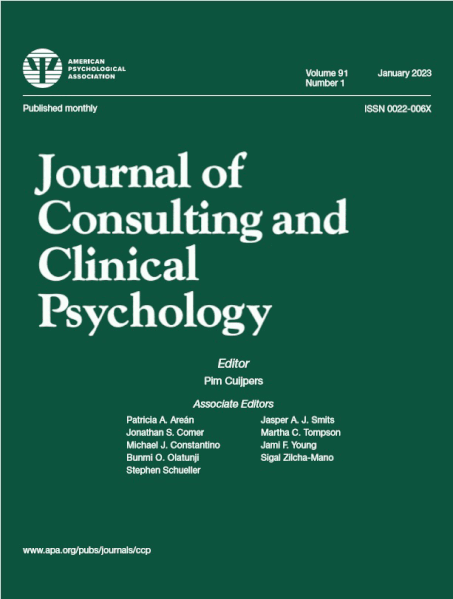以创伤为焦点的认知行为疗法对创伤后应激障碍的疗效:个体参与者数据荟萃分析。
IF 5
1区 心理学
Q1 PSYCHOLOGY, CLINICAL
引用次数: 0
摘要
目的:本研究旨在探讨创伤焦点认知行为疗法(CBT-TF)治疗创伤后应激障碍(PTSD)的有效性。此外,我们检验了调节因子对PTSD症状严重程度的影响。方法本研究纳入随机对照试验,将CBT-TF与不活动组或活动组进行比较。主要和次要结局分别是PTSD症状严重程度和缓解。调节因素包括社会人口学和临床变量。结果12项研究将CBT-TF与无活性对照(n = 625)进行比较,11项研究与有活性对照(n = 706)进行比较。单阶段个体参与者数据荟萃分析发现CBT-TF比无活动对照条件更有效(β = -0.78;OR = 2.34),与主动比较条件无显著差异(β = 0.02;OR = 0.53)分别在减轻PTSD症状严重程度和实现PTSD缓解方面。当将CBT-TF与非活动治疗进行比较时,调节分析发现,在完成分析(β = 0.93)和全样本分析(β = 0.59)中,离婚参与者在CBT-TF干预后的PTSD症状高于接受CBT-TF的单身、同居或已婚参与者。对于积极治疗比较,调节因子分析发现,在完全分析中,服用精神药物的参与者在CBT-TF后PTSD症状低于未服用精神药物的参与者(β = -0.39)。结论基于我们的调节分析,精神药物对CBT-TF干预过程的影响有待进一步研究。此外,接受CBT-TF治疗的离异PTSD患者可能会从增强的支持中受益。(PsycInfo Database Record (c) 2025 APA,版权所有)。本文章由计算机程序翻译,如有差异,请以英文原文为准。
Efficacy of cognitive behavioral therapies with a trauma focus for posttraumatic stress disorder: An individual participant data meta-analysis.
OBJECTIVE
This individual participant data meta-analysis aimed to investigate the effectiveness of cognitive behavioral therapy with a trauma focus (CBT-TF) for posttraumatic stress disorder (PTSD). Furthermore, we examined the effect of moderators on PTSD symptom severity.
METHOD
This study included randomized controlled trials comparing CBT-TF to an inactive or active comparison group for adults with PTSD. The primary and secondary outcomes were PTSD symptom severity and remission, respectively. Moderators included sociodemographic and clinical variables.
RESULTS
Twelve studies compared CBT-TF with inactive (n = 625) and 11 with active comparison conditions (n = 706). The one-stage individual participant data meta-analysis found that CBT-TF was more effective than inactive comparison conditions (β = -0.78; OR = 2.34) and not significantly different from active comparison conditions (β = 0.02; OR = 0.53) in reducing PTSD symptom severity and achieving PTSD remission, respectively. When comparing CBT-TF with inactive treatments, moderator analysis found that divorced participants had greater PTSD symptoms postintervention following CBT-TF than participants who were single, cohabitating, or married receiving CBT-TF, both in the completer (β = 0.93) and full-sample (β = 0.59) analyses. For the active treatment comparison, moderator analysis found that participants taking psychotropic medication had lower PTSD symptoms following CBT-TF than those not taking psychotropic medication in the completer analysis (β = -0.39).
CONCLUSION
Based on our moderator analyses, further research is needed to understand the effect of psychotropic medication on the CBT-TF intervention process. Moreover, divorced participants with PTSD receiving CBT-TF might benefit from enhanced support. (PsycInfo Database Record (c) 2025 APA, all rights reserved).
求助全文
通过发布文献求助,成功后即可免费获取论文全文。
去求助
来源期刊

Journal of consulting and clinical psychology
PSYCHOLOGY, CLINICAL-
CiteScore
9.00
自引率
3.40%
发文量
94
期刊介绍:
The Journal of Consulting and Clinical Psychology® (JCCP) publishes original contributions on the following topics: the development, validity, and use of techniques of diagnosis and treatment of disordered behaviorstudies of a variety of populations that have clinical interest, including but not limited to medical patients, ethnic minorities, persons with serious mental illness, and community samplesstudies that have a cross-cultural or demographic focus and are of interest for treating behavior disordersstudies of personality and of its assessment and development where these have a clear bearing on problems of clinical dysfunction and treatmentstudies of gender, ethnicity, or sexual orientation that have a clear bearing on diagnosis, assessment, and treatmentstudies of psychosocial aspects of health behaviors. Studies that focus on populations that fall anywhere within the lifespan are considered. JCCP welcomes submissions on treatment and prevention in all areas of clinical and clinical–health psychology and especially on topics that appeal to a broad clinical–scientist and practitioner audience. JCCP encourages the submission of theory–based interventions, studies that investigate mechanisms of change, and studies of the effectiveness of treatments in real-world settings. JCCP recommends that authors of clinical trials pre-register their studies with an appropriate clinical trial registry (e.g., ClinicalTrials.gov, ClinicalTrialsRegister.eu) though both registered and unregistered trials will continue to be considered at this time.
 求助内容:
求助内容: 应助结果提醒方式:
应助结果提醒方式:


